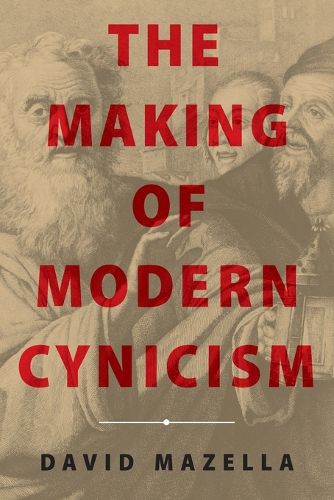Readings Newsletter
Become a Readings Member to make your shopping experience even easier.
Sign in or sign up for free!
You’re not far away from qualifying for FREE standard shipping within Australia
You’ve qualified for FREE standard shipping within Australia
The cart is loading…






Once describing a life of exile, self-denial, physical rigor, and mastery of one's desires, cynicism now describes a life of political quietism, passivity, and moral indifference, representing not a weakening of ancient philosophic norms but rather their inversion. In The Making of Modern Cynicism, David Mazella asks: how did ancient Cynic philosophy come to provide a name for its modern, unphilosophical counterpart, and what events caused such a dramatic reversal of cynicism's former meanings? He traces the concept of cynicism from its origins as a philosophical way of life in Greek antiquity through its successive transformations in the early modern and Enlightenment periods and into the nineteenth century when it took its distinctively modern, unreflective form as a variety of disenchantment, disbelief, or distrust. Sampling a wide variety of literary, philosophical, and historical writings, Mazella documents the transition of the cynic from an ascetic philosopher to any person whose "faded belief or curdled trust had left him unfit for attachments to others." Even more important, Mazella questions why cynicism should provoke such hand-wringing from cultural critics when it has been a stable, recognized, even routine feature of modern politics for the better part of 5 years. Arguing that modern cynics inspire powerful reactions by envisaging a future without hope of meaningful change, he then suggests that we address popular cynicism in more effective, less moralistic ways. Rather than dismissing cynicism as an irrational attitude of distrust or fatalism, or chiding cynics for their persistent disbelief, Mazella contends that analyzing cynicism can reveal the unacknowledged limits of current political argument, a crucial first step toward developing the kinds of reasoned persuasion necessary for more meaningful and substantive forms of political change.
Well-written and engaging, The Making of Modern Cynicism will appeal not only to readers in literary and cultural criticism but also to those interested in political theory and the history of philosophy.
$9.00 standard shipping within Australia
FREE standard shipping within Australia for orders over $100.00
Express & International shipping calculated at checkout
Once describing a life of exile, self-denial, physical rigor, and mastery of one's desires, cynicism now describes a life of political quietism, passivity, and moral indifference, representing not a weakening of ancient philosophic norms but rather their inversion. In The Making of Modern Cynicism, David Mazella asks: how did ancient Cynic philosophy come to provide a name for its modern, unphilosophical counterpart, and what events caused such a dramatic reversal of cynicism's former meanings? He traces the concept of cynicism from its origins as a philosophical way of life in Greek antiquity through its successive transformations in the early modern and Enlightenment periods and into the nineteenth century when it took its distinctively modern, unreflective form as a variety of disenchantment, disbelief, or distrust. Sampling a wide variety of literary, philosophical, and historical writings, Mazella documents the transition of the cynic from an ascetic philosopher to any person whose "faded belief or curdled trust had left him unfit for attachments to others." Even more important, Mazella questions why cynicism should provoke such hand-wringing from cultural critics when it has been a stable, recognized, even routine feature of modern politics for the better part of 5 years. Arguing that modern cynics inspire powerful reactions by envisaging a future without hope of meaningful change, he then suggests that we address popular cynicism in more effective, less moralistic ways. Rather than dismissing cynicism as an irrational attitude of distrust or fatalism, or chiding cynics for their persistent disbelief, Mazella contends that analyzing cynicism can reveal the unacknowledged limits of current political argument, a crucial first step toward developing the kinds of reasoned persuasion necessary for more meaningful and substantive forms of political change.
Well-written and engaging, The Making of Modern Cynicism will appeal not only to readers in literary and cultural criticism but also to those interested in political theory and the history of philosophy.